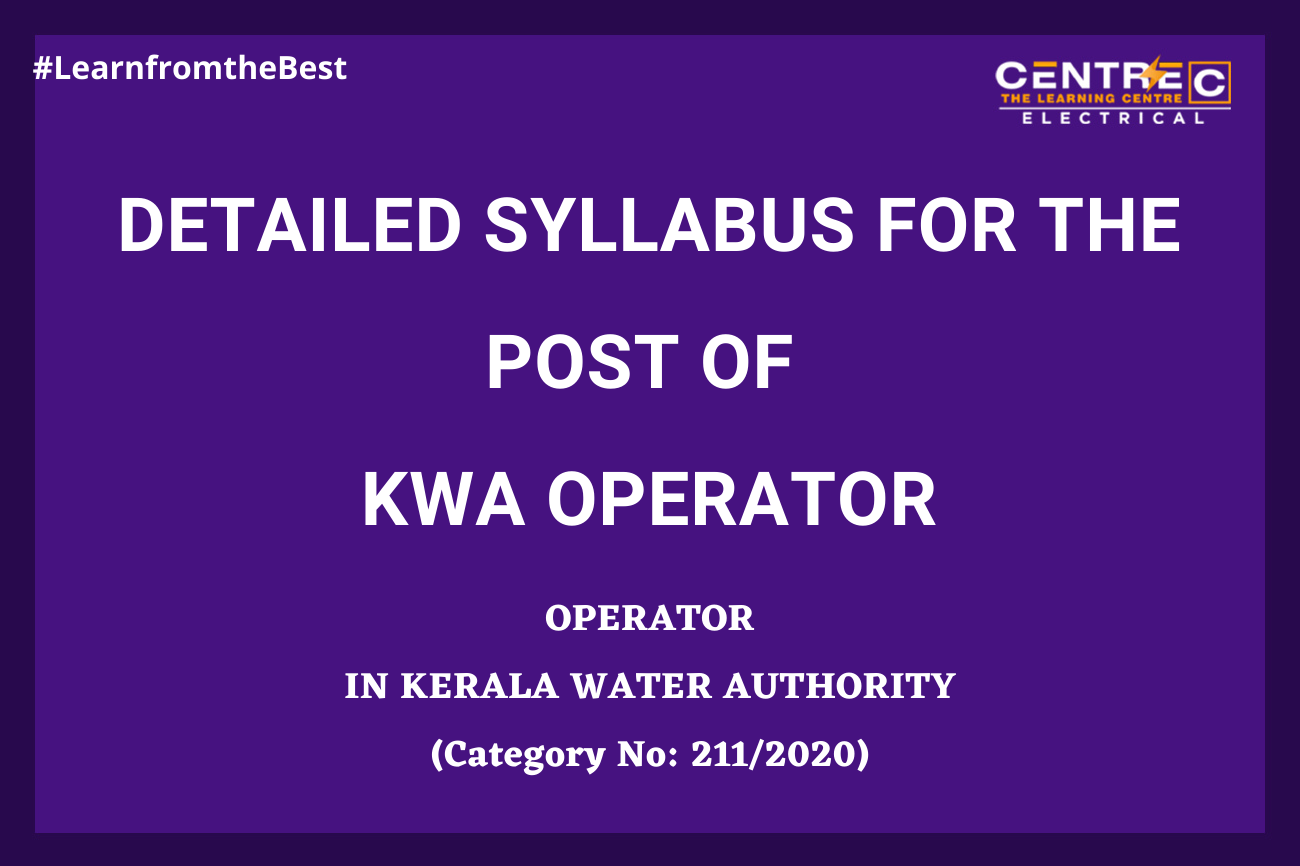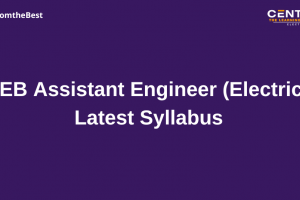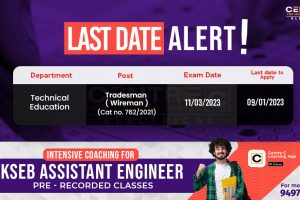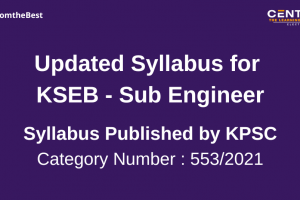
KWA OPERATOR SYLLABUS
Detailed Syllabus for the Post of KWA Operator 2021
OPERATOR
IN KERALA WATER AUTHORITY
(Category No: 211/2020)
Module I- Fundamentals of Electricity (5 Marks)
Voltage, Current, Resistance, Energy, Power-Definitions and Units, Ohm’s law – Statement, Simple problems related to Ohm’s law, Power and Energy, Resistance in series and Parallel -Simple problems. Kirchhoff’s laws – KCL and KVL.
Module II – Electrostatics and Electromagnetism (5 Marks)
Laws of Electrostatics, Permittivity, Electric Flux, Flux Density, Potential, Potential Difference – equations and simple problems, Lightning Phenomenon, Potential Gradient, Dielectric Strength, Capacitors in series and parallel, Energy stored in a Capacitor, Coulomb’s law, Permeability, Magnetic Flux, Flux density, Reluctance, mmf, Faraday’s law of Electromagnetic Induction, Lenz’s Law. Self Inductance, Mutual Inductance, Energy stored in an inductor, Fleming’s Laws
Module III – Fundamentals of AC Systems (5 Marks)
Generation of ac voltage, Equation of voltage, Basic terms – amplitude, frequency, cycle, time period, average value, instantaneous value, rms value, form factor, peak factor – equations and related simple problems, ac through resistance, inductance and capacitance, star and delta connections in 3 phase ac systems – line and phase relationship in star and delta systems.
Module IV – Measurements and measuring instruments (5 Marks)
Various types of electrical measuring instruments – Voltmeter, Ammeter, Energy Meter, Wattmeter, Single phase and Three phase power measurement, measurement of resistance, Inductance and Capacitance, Power factor meter, Synchroscope, TOD meter, CRO, Insulation megger and earth megger, multimeter, CT and PT.
Module V – Safety, First Aid, Batteries and Solar Cell (5 Marks)
Basic safety requirements, electric shock-requirement for avoiding shock, first aid, installation, care and maintenance of batteries and solar cells, determination of total number of cells required for a given power requirements.
Module VI – Wiring Accessories (5 Marks)
Various wiring systems, Wires-single strand and multistrand, current ratings. Fuses-cartridge and HRC. Switches – SPST, SPDT, TPTT, ICDP, ICTP, Toggle switch, Limit switch, safety devices- MCB, ELCB, RCCB, electrical illumination, Earthing – Pipe and Plate earthing.
Module VII- DC Machines (5 Marks)
DC generator – construction, working, classification, emf equation, wave and lap windings, characteristics, simple problems
DC motor – construction, working, types, emf equation, torque-simple problems, various starters, speed
control, testing, MG set.
Module VIII- AC Machines (5 Marks)
Transformer-construction, principle, types, emf equation, transformation ratio, losses and efficiency, all day efficiency-simple problems
Three phase induction motor-principle, construction, types, slip, torque, losses, efficiency, power stages, speed control, three phase motor starters
Alternators-construction, principle, emf equation, losses and efficiency,
Three phase synchronous motor.
Single phase and FHP motors-single phase induction motor, universal motor, ac series motor, servomotor, stepper motor, split phase motor
Module IX- Digital Electronics (5 Marks)
Number systems, logic gates-AND, OR, NOT, NAND, NOR, De-Morgan’s theorems, half adder, full adder, flip-flops, shift registers, counters, ADC, DAC, soldering Techniques
Module X – Power Electronics (5 Marks)
Half wave and full wave rectifiers with and without filters, UJT relaxations oscillator, FET, JFET, Triac, Diac, IGBT, SCR, operation and maintenance of inverter, regulated DC power supply, battery charger, UPS.
Mechanical
Module-1 (Pump a n d Fastenings) (10 marks)
Pump Industry in India – leading manufacturers, development in Pump Industry, trends, new product. Principle of centrifugal pump. Construction and operation of centrifugal pump in series and parallel. Finding defects and method to recondition centrifugal pump Submersible pump construction, operation and selection of appropriate type. Procedure to recondition, install and test of submersible pumps. Causes of failures and remedial measures. Priming of pump sets.
Fasteners- Types of screws, nuts, studs & bolts, locking devices, – lock nuts, cotter, split pins, keys, circlips, lock rings, locks washers and locating where they are used. Washers & chemical compounds can be used to help secure these fasteners. Function of Gaskets, Selection of materials for gaskets and packing, oil seals.
Sheet metal – the various common metal Sheets used in Metal shop Sheet metal operations – Shearing, bending, Drawing, Squeezing. Sheet metal joints – Hem & Seam Joints Fastening Methods – Riveting, soldering, Brazing.
Fluxes used on common joints. Sheet and wire-gauges. The blow lamp-its uses and pipe fittings.
Module-2. (I.C Engines) (10 marks)
Principle of Compression-ignition engine, Spark Ignition Engine, differentiates between 4- stroke and 2 stroke, C.I engine and S.I Engine, Otto cycle and Diesel cycle. Different type of starting and stopping method of Diesel Engine. Technical terms used in engine, Engine specification. Cleaning- fuel tank & check leak in the fuel line. Lubrication system – types, description and advantages of each over others. Filters and oil coolers– their description functions and method to overhaul for efficient functioning. Defects in pump sets- procedure for detection of causes & rectification. Purpose and balancing of rotor. Procedure to be followed for preventive & scheduled maintenance, planning for spares and other stores. Method of install align and testing of pumps for their serviceability. Concept of tightening torque for different sizes of bolts.
Module-3. (Basic electricity) (10 marks)
Basic electricity, Electricity principles, Ground connections, Ohm’s law, Voltage, Current, Resistance, Power, Energy. Voltmeter, ammeter, Ohm meter Mulitmeter, Conductors & insulators, Wires, Shielding, Length vs. resistance, Resistor ratings. Fuses & circuit breakers, Ballast resistor, Stripping wire insulation, cable colour codes and sizes, Resistors in Series
circuits , Parallel circuits and Series- parallel circuits, Electrostatic effects, Capacitors and its applications, Capacitors in series and parallel.
Batteries & cells, Lead acid batteries & Stay Maintenance Free (SMF) batteries, Magnetic effects, Heating effects, Thermo- electric energy, Thermisters, Thermo couples, Electrochemical energy, Photo-voltaic energy, Piezo-electric energy, Electromagnetic induction, Relays, Solenoids, Primary & Secondary windings, Transformers, stator and rotor coils.
Module- 4. (Power trasmission) (10 marks)
Types of pulleys solid, split, “V” groove, step, cone, taper, guided and jockey or rider pulleys, their functions and uses. Procedure to assemble and dismantle pulleys and impellers from shafts following safety precautions. AC Motors – related terminology. Purpose, type, construction, operation, testing for correct functioning, maintenance and industrial applications. Trouble shooting & protection of induction motor. Different types of valves-their description, advantages & use. Special pumps & glands used for corrosive fluids. Different gasket cement used to prevent leakage and advantages of each over the other. Principle of direct reading pressure and temperature measuring instruments. Method to read and application of pressure and temperature Measuring instruments. Starters and types of starter switches. Circuit Breakers and Isolators.
Module- 5.(Fluid valves) (10 marks)
Application of Gear pump- Internal & External, single acting, double acting & Double ended cylinder; Directional control valves-2/2, 3/2, 4/2, 4/3 way valve, Pressure relief valve, Non return valve, Flow control valve used Pneumatic Symbols, and function of air Reciprocating Compressor. Function of Air service unit (FRL-Filter, Regulator & Lubricator) Classification of rotary pumps- Construction and operation- repairing procedure. Brief description of turbine & stage pumps, positive displacements and their advantages. Meaning of priming and its effect. Installation Techniques of rotary pump- procedure, tools and equipment required. Pipes and pipe fittings. Pipe Joints. Pipe Gauging.

CENTRE C SOCIAL MEDIA PLATFORMS
Our Social media platforms are exclusively for Electrical Engineering students, job candidates, teachers and all those who have passion for Electrical Engineering.
You will get
- Electrical engineering quiz
- Regular job notifications
- Exam notifications
- E – News
- E – Shots
- Study tips
- Electrical related discussion and all in this group.




